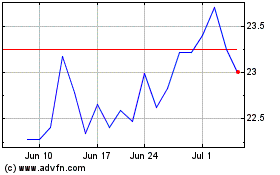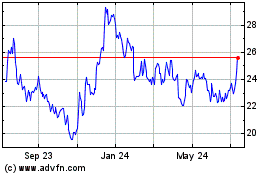Seacoast Banking Corporation of Florida (NASDAQ: SBCF)
("Seacoast"), the holding company for Seacoast National Bank
("Seacoast Bank"), announced today the completion of its
acquisition of Fourth Street Banking Company ("Fourth Street"),
effective August 21, 2020, pursuant to the merger of Fourth
Street with and into Seacoast and of Fourth Street's wholly-owned
banking subsidiary, Freedom Bank, with and into Seacoast Bank.
Under the terms of the merger agreement, Fourth
Street shareholders will receive 0.1275 shares of Seacoast common
stock for each share of Fourth Street common stock held immediately
prior to the merger. The resulting aggregate merger consideration
paid by Seacoast was approximately $41.7 million.
Freedom Bank, headquartered in St. Petersburg,
has deposits of approximately $359 million and loans of
approximately $312 million as of June 30, 2020. The acquisition
increases Seacoast’s presence in one of the strongest and fastest
growing markets in Florida, and complements Seacoast’s prior
acquisitions in the Tampa-St. Petersburg-Clearwater MSA, including
GulfShore Bank and NorthStar Bank in 2017.
“We welcome Freedom Bank’s customers and
employees into the Seacoast family,” said Dennis S. Hudson, III,
Seacoast Chairman and CEO. “We are confident they will readily
enjoy our broad range of convenient and mobile-accessible products
and services as well as Seacoast’s personalized brand of customer
service.”
Transaction Details
Piper Sandler Companies served as financial
advisor and Alston & Bird LLP served as legal counsel to
Seacoast. Hovde Group LLC served as financial advisor and Smith
Mackinnon PA served as legal counsel to Fourth Street.
Customer Information
Freedom Bank customers will benefit immediately
from the merger with access to Seacoast’s full suite of digital
banking products and local Florida-based customer service.
Additionally, customers will have fee-free access to Seacoast ATMs
and more than 1,250 Publix ATMs across the Southeast.
About Seacoast Banking Corporation of
Florida (NASDAQ: SBCF)
Seacoast Banking Corporation of Florida is one
of the largest community banks headquartered in Florida with
approximately $8.1 billion in assets and $6.7 billion in deposits
as of June 30, 2020. The Company provides integrated financial
services including commercial and retail banking, wealth
management, and mortgage services to customers through advanced
banking solutions and 50 traditional branches of its
locally-branded, wholly-owned subsidiary bank, Seacoast Bank.
Seacoast operates primarily in Florida, with concentrations in the
state's fastest growing markets. The Company's offices stretch from
the southeast, including Fort Lauderdale, Boca Raton and Palm Beach
north along the east coast to the Daytona area, into Orlando and
Central Florida and the adjacent Tampa market, and west to
Okeechobee and surrounding counties. More information about the
Company is available at www.SeacoastBanking.com.
Cautionary Notice Regarding
Forward-Looking Statements
This press release contains "forward-looking
statements" within the meaning, and protections, of Section 27A of
the Securities Act of 1933 and Section 21E of the Securities
Exchange Act of 1934, including, without limitation, statements
about future financial and operating results, cost savings,
enhanced revenues, economic and seasonal conditions in our markets,
and improvements to reported earnings that may be realized from
cost controls, tax law changes, new initiatives and for integration
of banks that we have acquired, or expect to acquire, including
Fourth Street, as well as statements with respect to Seacoast's
objectives, strategic plans, including Vision 2020, expectations
and intentions and other statements that are not historical facts,
any of which may be impacted by the COVID-19 pandemic and related
effects on the U.S. economy. Actual results may differ from those
set forth in the forward-looking statements.
Forward-looking statements include statements
with respect to our beliefs, plans, objectives, goals,
expectations, anticipations, assumptions, estimates and intentions
about future performance and involve known and unknown risks,
uncertainties and other factors, which may be beyond our control,
and which may cause the actual results, performance or achievements
of Seacoast to be materially different from future results,
performance or achievements expressed or implied by such
forward-looking statements. You should not expect us to update any
forward-looking statements.
All statements other than statements of
historical fact could be forward-looking statements. You can
identify these forward-looking statements through our use of words
such as "may", "will", "anticipate", "assume", "should", "support",
"indicate", "would", "believe", "contemplate", "expect",
"estimate", "continue", "further", "plan", "point to", "project",
"could", "intend", "target" or other similar words and expressions
of the future. These forward-looking statements may not be realized
due to a variety of factors, including, without limitation: the
effects of future economic and market conditions, including
seasonality and the adverse impact of COVID-19 (economic and
otherwise); governmental monetary and fiscal policies, including
interest rate policies of the Board of Governors of the Federal
Reserve, as well as legislative, tax and regulatory changes;
changes in accounting policies, rules and practices, including the
impact of the adoption of CECL; the risks of changes in interest
rates on the level and composition of deposits, loan demand,
liquidity and the values of loan collateral, securities, and
interest sensitive assets and liabilities; interest rate risks,
sensitivities and the shape of the yield curve; uncertainty related
to the impact of LIBOR calculations on securities and loans;
changes in borrower credit risks and payment behaviors; changes in
the availability and cost of credit and capital in the financial
markets; changes in the prices, values and sales volumes of
residential and commercial real estate; our ability to comply with
any regulatory requirements; the effects of problems encountered by
other financial institutions that adversely affect us or the
banking industry; our concentration in commercial real estate
loans; the failure of assumptions and estimates, as well as
differences in, and changes to, economic, market and credit
conditions; the impact on the valuation of our investments due to
market volatility or counterparty payment risk; statutory and
regulatory dividend restrictions; increases in regulatory capital
requirements for banking organizations generally; the risks of
mergers, acquisitions and divestitures, including our ability to
continue to identify acquisition targets and successfully acquire
desirable financial institutions; changes in technology or products
that may be more difficult, costly, or less effective than
anticipated; our ability to identify and address increased
cybersecurity risks; inability of our risk management framework to
manage risks associated with our business; dependence on key
suppliers or vendors to obtain equipment or services for our
business on acceptable terms; reduction in or the termination of
our ability to use the mobile-based platform that is critical to
our business growth strategy; the effects of war or other
conflicts, acts of terrorism, natural disasters, health
emergencies, epidemics or pandemics, or other catastrophic events
that may affect general economic conditions; unexpected outcomes of
and the costs associated with, existing or new litigation involving
us; our ability to maintain adequate internal controls over
financial reporting; potential claims, damages, penalties, fines
and reputational damage resulting from pending or future
litigation, regulatory proceedings and enforcement actions; the
risks that our deferred tax assets could be reduced if estimates of
future taxable income from our operations and tax planning
strategies are less than currently estimated and sales of our
capital stock could trigger a reduction in the amount of net
operating loss carryforwards that we may be able to utilize for
income tax purposes; the effects of competition from other
commercial banks, thrifts, mortgage banking firms, consumer finance
companies, credit unions, securities brokerage firms, insurance
companies, money market and other mutual funds and other financial
institutions operating in our market areas and elsewhere, including
institutions operating regionally, nationally and internationally,
together with such competitors offering banking products and
services by mail, telephone, computer and the Internet; and the
failure of assumptions underlying the establishment of reserves for
possible loan losses.
The risks relating to the Fourth Street merger
include, without limitation: the diversion of management time on
issues related to the merger; unexpected transaction costs,
including the costs of integrating operations; the risks that the
businesses will not be integrated successfully or that such
integration may be more difficult, time- consuming or costly than
expected; the potential failure to fully or timely realize expected
revenues and revenue synergies, including as the result of revenues
following the merger being lower than expected; the risk of deposit
and customer attrition; any changes in deposit mix; unexpected
operating and other costs, which may differ or change from
expectations; the risks of customer and employee loss and business
disruptions, including, without limitation, as the result of
difficulties in maintaining relationships with employees; increased
competitive pressures and solicitations of customers by
competitors; as well as the difficulties and risks inherent with
entering new markets.
Given the many unknowns and risks being heavily
weighted to the downside, our forward-looking statements are
subject to the risk that conditions will be substantially different
than we are currently expecting. If efforts to contain COVID-19 are
unsuccessful and restrictions on movement last into the third
quarter or beyond, the recession would be much longer and much more
severe. Ineffective fiscal stimulus, or an extended delay in
implementing it, are also major downside risks. The deeper the
recession is, and the longer it lasts, the more it will damage
consumer fundamentals and sentiment. This could both prolong the
recession, and/or make any recovery weaker. Similarly, the
recession could damage business fundamentals. And an extended
global recession due to COVID-19 would weaken the U.S. recovery. As
a result, the outbreak and its consequences, including responsive
measures to manage it, have had and are likely to continue to have
an adverse effect, possibly materially, on our business and
financial performance by adversely affecting, possibly materially,
the demand and profitability of our products and services, the
valuation of assets and our ability to meet the needs of our
customers.
All written or oral forward-looking statements
attributable to us are expressly qualified in their entirety by
this cautionary notice, including, without limitation, those risks
and uncertainties described in our annual report on Form 10-K for
the year ended December 31, 2019 and quarterly reports on Form 10-Q
for the quarters ended March 31, 2020 and June 30, 2020, under
"Special Cautionary Notice Regarding Forward-looking Statements"
and "Risk Factors", and otherwise in our SEC reports and filings.
Such reports are available upon request from the Company, or from
the Securities and Exchange Commission, including through the SEC's
Internet website at www.sec.gov.
Media Contact:Jennifer
Reissman772-463-8947Jennifer.Reissman@seacoastbank.com
Seacoast Banking Corpora... (NASDAQ:SBCF)
Historical Stock Chart
From Mar 2024 to Apr 2024

Seacoast Banking Corpora... (NASDAQ:SBCF)
Historical Stock Chart
From Apr 2023 to Apr 2024
